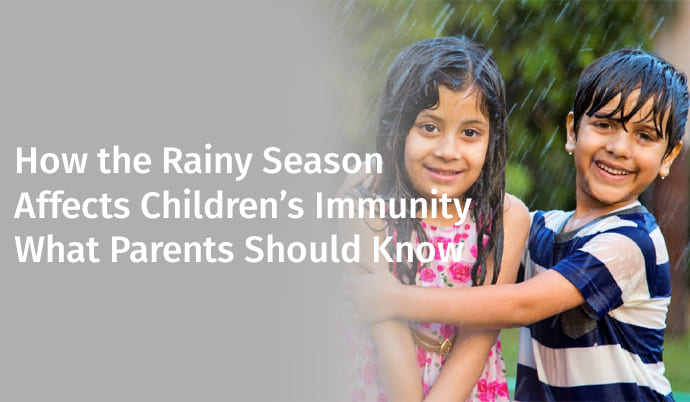
As a 2022 India Council of Medical Research (ICMR) report had noted, with the onset of the monsoon season, the rates of seasonal infections are witnessed to increase by 20-30% among children below 10 years of age. The rainy season can be a nightmare, especially when the child catches both water-borne diseases as well as lung infections.
And thus, in case you are wondering why your child is yet again suffering because of the common cold as soon as it has rained to bless your town, this is your monsoon survival guide. It is time to splash around in the sensational world of the immunity of children and how to keep it strong and stable when the clouds get into the skies.
The Monsoon- Immunity Equation
Immunity is a force within your child, and there is a natural, inbuilt defence team developed over the years, which is a combination of genetics, diet, and environment, along with exposure to infections. This squad has to cope with an excessive number of issues during monsoons:
Children (toddlers and preschoolers) do not possess developed immune systems yet, and that is why they are more likely to be infected with something more than once during these months.
Monsoon-Related Disease in Children
Now, let us speak of the common villains that intrude upon your rainy calm:
1. Cold and Flu
Colds and flu are among the most common ailments. According to the American Academy of Family Physicians, a cold is defined as: The common cold is an inflammatory process of the respiratory tract that is usually caused by a virus. Runnier noses, scratchy throats, sneezing marathons, yes! These are almost mascots of monsoon. Transmission occurs when there is a sudden change of temperature and crowding indoors.
2. Waterborne Infections
Polluted water bodies result in the rapid spread of illnesses such as typhoid, cholera and diarrhoea, particularly in children who have weak digestive systems.
3. Mosquito-Borne Illnesses
Stagnant water contributes to the occurrence of cases of dengue and malaria, which rise with the rains. The National Vector Borne Disease Control Programme data shows that the total number of dengue cases in India in 2023 alone was above 1.9 lakh, and children made up a big part of the total.
4. Fungal Infections
Permanent moisture causes rashes on the skin, pruritus, and fungal infections in the areas of moist folds and diapers.
5. Respiratory Infections
Asthmatic children or children with allergic predisposition can feel an aggravation of a condition caused by the mould, the dust, and the pollen suspended in the air with the humidity.
Tips to Strengthen the Immunity of Your Child in Monsoons
We are not going to play defence against this rainy season; we are going to put up a fortress!
1. Rely upon the King of Nutrition
2. Prioritise Sleep
The amount of sleep that children require is 9-12 hours, according to age. When you are sleep-deprived, resistance is decreased and healing is reduced.
3. Hygiene Is Your Superpower
4. Boiling Or Filtering of Drinking Water
Tap water can be an inconspicuous carrier of germs, even though it can look clean. Use boiling or RO-filtered water, and this is very important for your child.
5. Dress Smart
Cotton clothes that cover legs and arms will keep mosquitoes at a distance, but also ensure that skin is not covered with clothes.
6. Mosquito Control
Make sure to use repellents that are child-friendly, wear nets and keep the area well cleaned and dry. Residual water in planters and coolers should not be allowed to remain stagnant or in corners of rooftops.
7. Vaccines
Monsoon or non-monsoon early immunisations are very important to prevent those diseases which are preventable, i.e. typhoid, hepatitis-A and flu.
When do you need to visit a Doctor?
In case your child experiences a high fever that lasts over 48 hours, does not accept food or fluid, constantly vomits, or has diarrhoea or signs of lack of energy or difficulty breathing, rush to visit a paediatrician. Do what your instinct tells you to do since you know your baby better than anybody does. There is no harm in being prepared rather than getting caught in the rain during the monsoon.
The Department of Paediatrics at Sir Ganga Ram Hospital is a beacon of hope and has proven to be a bastion of trust, care, and exceptional medical professionalism in keeping your child safe, especially during a difficult time of the monsoon. The department is very much prepared to respond to the varying types of seasonal infections, having a panel that is accompanied by paediatricians, neonatologists, and specialists in infectious disease, using
coordinated effort to give time, accurate and sensitive care. Part of its mandate is dealing with cases of acute fever, respiratory complications, and stomach infections, to providing preventive measures such as immunisation. The department does not leave a stone unturned in providing all-round, healthy enhancing services to all the children. Having round-the-clock emergency care, highly advanced diagnostic instruments, and child-environment consultation rooms, parents can feel reassured and obtain the most credible assistance. Sir Ganga Ram Hospital is devoted to preventive paediatrics, with annual wellness testing, nutrition advice, and immunity-enhancing programs being part of the treatment regimen. It can be chronic colds, or protection against mosquito-related diseases; either way, the specialists at Sir Ganga Ram Hospital are able to combine science with understanding of the condition and what the child and parents need, that is, not only care, but advice on care.
That monsoon may bring it with the package of sniffles, but it is a full opportunity to make the kids learn how to take care of themselves, even in the most difficult season of nature. It is not about bubble-wrapping your kid, but making his or her little immune system stand tall whenever they take a splash. Why not have them jump in some puddles, dance in the drizzle and have piping hot bhuttas with you, but don't forget to maintain a high level of hygiene and a higher level of immunity. For effective care and treatment during this rainy season, book an appointment at Sir Ganga Ram Hospital today.




